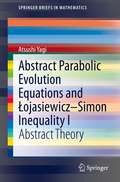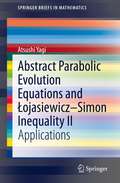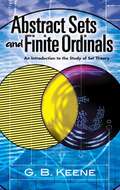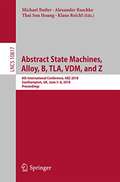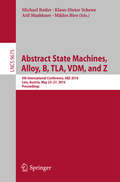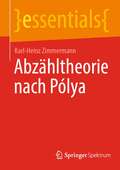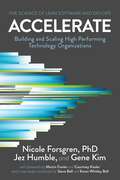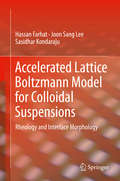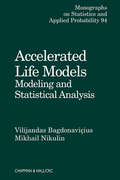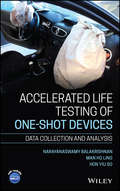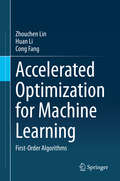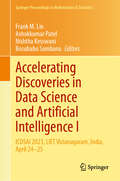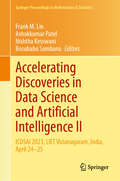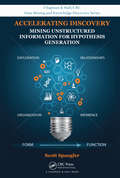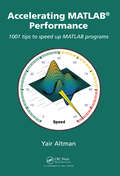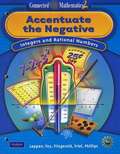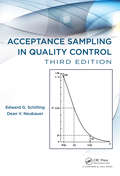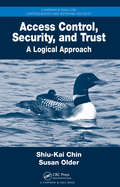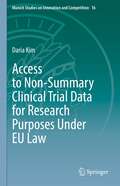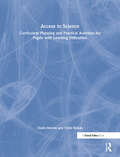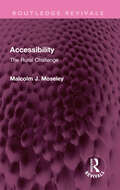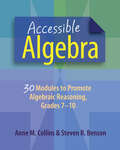- Table View
- List View
Abstract Parabolic Evolution Equations and Łojasiewicz–Simon Inequality I: Abstract Theory (SpringerBriefs in Mathematics)
by Atsushi YagiThe classical Łojasiewicz gradient inequality (1963) was extended by Simon (1983) to the infinite-dimensional setting, now called the Łojasiewicz–Simon gradient inequality. This book presents a unified method to show asymptotic convergence of solutions to a stationary solution for abstract parabolic evolution equations of the gradient form by utilizing this Łojasiewicz–Simon gradient inequality.In order to apply the abstract results to a wider class of concrete nonlinear parabolic equations, the usual Łojasiewicz–Simon inequality is extended, which is published here for the first time. In the second version, these abstract results are applied to reaction–diffusion equations with discontinuous coefficients, reaction–diffusion systems, and epitaxial growth equations. The results are also applied to the famous chemotaxis model, i.e., the Keller–Segel equations even for higher-dimensional ones.
Abstract Parabolic Evolution Equations and Łojasiewicz–Simon Inequality II: Applications (SpringerBriefs in Mathematics)
by Atsushi YagiThis second volume continues the study on asymptotic convergence of global solutions of parabolic equations to stationary solutions by utilizing the theory of abstract parabolic evolution equations and the Łojasiewicz–Simon gradient inequality. In the first volume of the same title, after setting the abstract frameworks of arguments, a general convergence theorem was proved under the four structural assumptions of critical condition, Lyapunov function, angle condition, and gradient inequality. In this volume, with those abstract results reviewed briefly, their applications to concrete parabolic equations are described.Chapter 3 presents a discussion of semilinear parabolic equations of second order in general n-dimensional spaces, and Chapter 4 is devoted to treating epitaxial growth equations of fourth order, which incorporate general roughening functions. In Chapter 5 consideration is given to the Keller–Segel equations in one-, two-, and three-dimensional spaces. Some of these results had already been obtained and published by the author in collaboration with his colleagues. However, by means of the abstract theory described in the first volume, those results can be extended much more.Readers of this monograph should have a standard-level knowledge of functional analysis and of function spaces. Familiarity with functional analytic methods for partial differential equations is also assumed.
Abstract Sets and Finite Ordinals: An Introduction to the Study of Set Theory
by G. B. KeeneThis text unites the logical and philosophical aspects of set theory in a manner intelligible both to mathematicians without training in formal logic and to logicians without a mathematical background. It combines an elementary level of treatment with the highest possible degree of logical rigor and precision.Starting with an explanation of all the basic logical terms and related operations, the text progresses through a stage-by-stage elaboration that proves the fundamental theorems of finite sets. It focuses on the Bernays theory of finite classes and finite sets, exploring the system's basis and development, including Stage I and Stage II theorems, the theory of finite ordinals, and the theory of finite classes and finite sets. This volume represents an excellent text for undergraduates studying intermediate or advanced logic as well as a fine reference for professional mathematicians.
Abstract State Machines, Alloy, B, TLA, VDM, and Z: 5th International Conference, Abz 2016, Linz, Austria, May 23-27, 2016, Proceedings (Lecture Notes in Computer Science #9675)
by Michael Butler Atif Mashkoor Miklos Biro Laus-Dieter ScheweThis book constitutes the refereed proceedings of the 5th International Conference on Abstract State Machines, Alloy, B, TLA, VDM, and Z, ABZ 2016, held in Linz, Austria, in May 2016. <P><P> The 17 full and 15 short papers presented in this volume were carefully reviewed and selected from 61 submissions. They record the latest research developments in state-based formal methods Abstract State Machines, Alloy, B, Circus, Event-B, TLS+, VDM and Z.
Abstract State Machines, Alloy, B, TLA, VDM, and Z: 5th International Conference, ABZ 2016, Linz, Austria, May 23-27, 2016, Proceedings (Lecture Notes in Computer Science #9675)
by Michael Butler Klaus-Dieter Schewe Atif Mashkoor Miklos BiroThis bookconstitutes the refereed proceedings of the 5th International Conference on AbstractState Machines, Alloy, B, TLA, VDM, and Z, ABZ 2016, held in Linz, Austria, inMay 2016. The 17 full and 15 short papers presented in this volume were carefullyreviewed and selected from 61 submissions. They record the latest researchdevelopments in state-based formal methods Abstract State Machines, Alloy, B,Circus, Event-B, TLS+, VDM and Z.
Abzähltheorie nach Pólya (essentials)
by Karl-Heinz ZimmermannIm Zentrum dieses essentials steht der gefeierte Abzählsatz von Pólya. Damit lassen sich kombinatorische Objekte mit Symmetrien abzählen, wie etwa Halsketten mit bunten Perlen und Würfel mit gefärbten Seiten, aber auch Graphen und Bäume. Die Gruppentheorie wird dafür benutzt, die Symmetrien der abzuzählenden Figuren zu beschreiben. Darauf aufbauend kann anhand der Operation der jeweiligen Symmetriegruppe auf den gefärbten Figuren die Anzahl der verschiedenen Muster ermittelt werden. Grundlegend hierfür ist das Lemma von Burnside. Aus seiner gewichteten Fassung wird unter Einbeziehung der Zyklenindexpolynome von Symmetriegruppen der berühmte Pólyasche Satz hergeleitet. Einige Beispiele runden die Darstellung ab.
Accelerate: The Science of Lean Software and DevOps: Building and Scaling High Performing Technology Organizations
by Nicole Forsgren, PhD Jez Humble Gene KimWinner of the Shingo Publication AwardAccelerate your organization to win in the marketplace.How can we apply technology to drive business value? For years, we've been told that the performance of software delivery teams doesn't matter―that it can't provide a competitive advantage to our companies. Through four years of groundbreaking research to include data collected from the State of DevOps reports conducted with Puppet, Dr. Nicole Forsgren, Jez Humble, and Gene Kim set out to find a way to measure software delivery performance―and what drives it―using rigorous statistical methods. This book presents both the findings and the science behind that research, making the information accessible for readers to apply in their own organizations.Readers will discover how to measure the performance of their teams, and what capabilities they should invest in to drive higher performance. This book is ideal for management at every level.
Accelerated Lattice Boltzmann Model for Colloidal Suspensions: Rheology and Interface Morphology
by Hassan Farhat Joon Sang Lee Sasidhar KondarajuColloids are ubiquitous in the food, medical, cosmetics, polymers, water purification, and pharmaceutical industries. The thermal, mechanical, and storage properties of colloids are highly dependent on their interface morphology and their rheological behavior. Numerical methods provide a convenient and reliable tool for the study of colloids. Accelerated Lattice Boltzmann Model for Colloidal Suspensions introduce the main building-blocks for an improved lattice Boltzmann-based numerical tool designed for the study of colloidal rheology and interface morphology. This book also covers the migrating multi-block used to simulate single component, multi-component, multiphase, and single component multiphase flows and their validation by experimental, numerical, and analytical solutions. Among other topics discussed are the hybrid lattice Boltzmann method (LBM) for surfactant-covered droplets; biological suspensions such as blood; used in conjunction with the suppression of coalescence for investigating the rheology of colloids and microvasculature blood flow. The presented LBM model provides a flexible numerical platform consisting of various modules that could be used separately or in combination for the study of a variety of colloids and biological flow deformation problems.
Accelerated Life Models: Modeling and Statistical Analysis (Chapman & Hall/CRC Monographs on Statistics and Applied Probability)
by Vilijandas Bagdonavicius Mikhail NikulinThe authors of this monograph have developed a large and important class of survival analysis models that generalize most of the existing models. In a unified, systematic presentation, this monograph fully details those models and explores areas of accelerated life testing usually only touched upon in the literature.Accelerated Life Models:
Accelerated Life Testing of One-shot Devices: Data Collection and Analysis
by Narayanaswamy Balakrishnan Man Ho Ling Hon Yiu SoProvides authoritative guidance on statistical analysis techniques and inferential methods for one-shot device life-testing Estimating the reliability of one-shot devices—electro-expolsive devices, fire extinguishers, automobile airbags, and other units that perform their function only once—poses unique analytical challenges to conventional approaches. Due to how one-shot devices are censored, their precise failure times cannot be obtained from testing. The condition of a one-shot device can only be recorded at a specific inspection time, resulting in a lack of lifetime data collected in life-tests. Accelerated Life Testing of One-shot Devices: Data Collection and Analysis addresses the fundamental issues of statistical modeling based on data collected from accelerated life-tests of one-shot devices. The authors provide inferential methods and procedures for planning accelerated life-tests, and describe advanced statistical techniques to help reliability practitioners overcome estimation problems in the real world. Topics covered include likelihood inference, competing-risks models, one-shot devices with dependent components, model selection, and more. Enabling readers to apply the techniques to their own lifetime data and arrive at the most accurate inference possible, this practical resource: Provides expert guidance on comprehensive data analysis of one-shot devices under accelerated life-tests Discusses how to design experiments for data collection from efficient accelerated life-tests while conforming to budget constraints Helps readers develops optimal designs for constant-stress and step-stress accelerated life-tests, mainstream life-tests commonly used in reliability practice Includes R code in each chapter for readers to use in their own analyses of one-shot device testing data Features numerous case studies and practical examples throughout Highlights important issues, problems, and future research directions in reliability theory and practice Accelerated Life Testing of One-shot Devices: Data Collection and Analysis is essential reading for graduate students, researchers, and engineers working on accelerated life testing data analysis.
Accelerated Optimization for Machine Learning: First-Order Algorithms
by Zhouchen Lin Huan Li Cong FangThis book on optimization includes forewords by Michael I. Jordan, Zongben Xu and Zhi-Quan Luo. Machine learning relies heavily on optimization to solve problems with its learning models, and first-order optimization algorithms are the mainstream approaches. The acceleration of first-order optimization algorithms is crucial for the efficiency of machine learning. Written by leading experts in the field, this book provides a comprehensive introduction to, and state-of-the-art review of accelerated first-order optimization algorithms for machine learning. It discusses a variety of methods, including deterministic and stochastic algorithms, where the algorithms can be synchronous or asynchronous, for unconstrained and constrained problems, which can be convex or non-convex. Offering a rich blend of ideas, theories and proofs, the book is up-to-date and self-contained. It is an excellent reference resource for users who are seeking faster optimization algorithms, as well as for graduate students and researchers wanting to grasp the frontiers of optimization in machine learning in a short time.
Accelerating Discoveries in Data Science and Artificial Intelligence I: ICDSAI 2023, LIET Vizianagaram, India, April 24–25 (Springer Proceedings in Mathematics & Statistics #421)
by Frank M. Lin Ashokkumar Patel Nishtha Kesswani Bosubabu SambanaThe Volume 1 book on Accelerating Discoveries in Data Science and Artificial Intelligence (Proceedings of ICDSAI 2023), that was held on April 24-25, 2023 by CSUSB USA, the International Association of Academicians (IAASSE), and the Lendi Institute of Engineering and Technology, Vizianagaram, India is intended to be used as a reference book for researchers and practitioners in the disciplines of AI and data science. The book introduces key topics and algorithms and explains how these contribute to healthcare, manufacturing, law, finance, retail, real estate, accounting, digital marketing, and various other fields. The book is primarily meant for academics, researchers, and engineers who want to employ data science techniques and AI applications to address real-world issues. Besides that, businesses and technology creators will also find it appealing to use in industry.
Accelerating Discoveries in Data Science and Artificial Intelligence II: ICDSAI 2023, LIET Vizianagaram, India, April 24–25 (Springer Proceedings in Mathematics & Statistics #438)
by Nishtha Kesswani Frank M. Lin Ashokkumar Patel Bosubabu SambanaThis edited volume on machine learning and big data analytics (Proceedings of ICDSAI 2023), that was held on April 24-25, 2023 by CSUSB USA, International Association of Academicians (IAASSE), and Lendi Institute of Engineering and Technology, Vizianagaram, India is intended to be used as a reference book for researchers and practitioners in the disciplines of AI and Data Science. With the fascinating development of technologies in several industries, there are numerous opportunities to develop innovative intelligence technologies to solve a wide range of uncertainties in various real-life problems. Researchers and academics have been drawn to building creative AI strategies by combining data science with classic mathematical methodologies. The book brings together leading researchers who wish to continue to advance the field and create a broad knowledge about the most recent research.
Accelerating Discovery: Mining Unstructured Information for Hypothesis Generation (Chapman & Hall/CRC Data Mining and Knowledge Discovery Series)
by Scott SpanglerUnstructured Mining Approaches to Solve Complex Scientific ProblemsAs the volume of scientific data and literature increases exponentially, scientists need more powerful tools and methods to process and synthesize information and to formulate new hypotheses that are most likely to be both true and important. Accelerating Discovery: Mining Unstructu
Accelerating MATLAB Performance: 1001 tips to speed up MATLAB programs
by Yair M. AltmanThe MATLAB programming environment is often perceived as a platform suitable for prototyping and modeling but not for "serious" applications. One of the main complaints is that MATLAB is just too slow. Accelerating MATLAB Performance aims to correct this perception by describing multiple ways to greatly improve MATLAB program speed. Packed with tho
Accentuate the Negative: Integers and Rational Numbers
by Glenda Lappan Elizabeth Difanis Phillips James T. Fey Susan N. FrielIn this book; you will study integers and rational numbers, two specific sets of numbers that include positive and negative numbers. You will explore models that help you think about adding, subtracting, multiplying and dividing these numbers. You will also learn about the properties of operations on positive and negative numbers. Connected Mathematics® is a registered trademark of Pearson Education, Inc.
Accentuate the Negative, Integers and Rational Numbers
by Glenda Lappan James T. Fey William M. Fitzgerald Susan N. Friel Elizabeth Difanis PhillipsNIMAC-sourced textbook
Accentuate the Negative, Integers and Rational Numbers
by Glenda Lappan James T. Fey William M. Fitzgerald Susan N. Friel Elizabeth Difanis PhillipsNIMAC-sourced textbook
Accentuate the Negative, Integers and Rational Numbers (Texas)
by Glenda Lappan James T. Fey William M. Fitzgerald Susan N. Friel Elizabeth Difanis Phillips WestWordsNIMAC-sourced textbook
Acceptance Sampling in Quality Control
by Edward Schilling Dean NeubauerAcceptance Sampling in Quality Control, Third Edition presents the state of the art in the methodology of sampling while integrating both theory and best practices. It discusses various standards, including those from the ISO, MIL-STD and ASTM and explores how to set quality levels. The book also includes problems at the end of each chapter with solutions. This edition improves upon the previous editions especially in the areas of software applications and compliance sampling plans. New to the Third Edition: Numerous Microsoft Excel templates to address sampling plans are used. Commercial software applications are discussed at the end of many chapters. Discussion of quick switching systems has been expanded to account for the considerable recent activity in this area. Added discussion of zero acceptance number chained quick switching systems.
Access Control, Security, and Trust: A Logical Approach
by Shiu-Kai Chin Susan Beth OlderDeveloped from the authors' courses at Syracuse University and the U.S. Air Force Research Laboratory, Access Control, Security, and Trust: A Logical Approach equips readers with an access control logic they can use to specify and verify their security designs. Throughout the text, the authors use a single access control logic based on a simple pro
Access to Non-Summary Clinical Trial Data for Research Purposes Under EU Law (Munich Studies on Innovation and Competition #16)
by Daria KimThis book draws a unique perspective on the regulation of access to clinical trial data as a case on research and knowledge externalities. Notwithstanding numerous potential benefits for medical research and public health, many jurisdictions have struggled to ensure access to clinical trial data, even at the level of the trial results. Pro-access policy initiatives have been strongly opposed by research-based drug companies arguing that mandatory data disclosure impedes their innovation incentives. Conventionally, access to test data has been approached from the perspective of transparency and research ethics. The book offers a complementary view and considers access to individual patient-level trial data for exploratory analysis as a matter of research and innovation policy. Such approach appears to be especially relevant in the data-driven economy where digital data constitutes a valuable economic resource. The study seeks to define how the rules of access to clinical trial data should be designed to reconcile the policy objectives of leveraging the research potential of data through secondary analysis, on the one hand, and protecting economic incentives of research-based drug companies, on the other hand. Overall, it is argued that the mainstream innovation-based justification for exclusive control over the outcomes of research and development can hardly rationalise trial sponsors’ control over primary data from trials. Instead, access to such data and its robust analysis should be prioritised.
Access to Science: Curriculum Planning and Practical Activities for Pupils with Learning Difficulties
by Claire Marvin Chris StokoeThis accessible and practical teaching resource focuses on access to the science curriculum for pupils with learning difficulties. Within an inclusive framework of participation and achievement for all, the core of the book provides support and ideas for the effective planning and implementation of well-differentiated science-focused activities. The book offers activities that are designed to motivate and challenge pupils with diverse individual needs; guidance on differentiation in early years and across all key stages; suggestions for teaching early developmental skills through sensory science; defined learning outcomes that demonstrate progression in curriculum content and experience; assessment and recording opportunities; and guidance on how to incorporate science in a cross-curricular way. Written by authors who have direct experience in the field, this book will provide practical help to all those working with pupils with learning difficulties in early years settings and in mainstream and special schools.
Accessibility: The Rural Challenge (Routledge Revivals)
by Malcolm J. MoseleyOriginally published in 1979, this book discusses the problem faced by planners, county councils, transport, health and education authorities as well as the inhabitants of rural Britain, of the inaccessibility of many areas of the UK. For certain sections of society such as the less well-off, children and teenagers and the elderly the impact is felt most strongly when local shops, schools and medical services are withdrawn in favour of larger units in distant towns. The book reviews the process of decline which led to this situation and considers the concept of accessibility to show how it can be developed into an analytical tool for measuring the success or failure of alternative policies. Each policy option is discussed in detail: the support of conventional bus or other transport services; the provision of mobile services; ‘mini-outlet’ policies and the long-term restructuring of the rural settlement pattern.
Accessible Algebra: 30 Modules to Promote Algebraic Reasoning, Grades 7-10
by Anne Collins Steven BensonAccessible Algebra: 30 Modules to Promote Algebraic Reasoning, Grades 7-10' is for any pre-algebra or algebra teacher who wants to provide a rich and fulfilling experience for students as they develop new ways of thinking through and about algebra.' The book includes 30 lessons that identifies' a focal domain and standard in algebra, then lays out the common misconceptions and challenges students may face as they work to investigate and understand problems.' Authors Anne Collins and Steven Benson' conferred with students in real classrooms as the students explained what problem-solving strategies they were using or worked to ask the right questions that would lead them to a deeper understanding of algebra. Each scenario represents actual instances of an algebra classroom that demonstrate effective teaching methods, real-life student questions, and conversations about the problems at hand.' Accessible Algebra' works for students at every level. In each lesson there are' sections on how to support struggling students, as well as ways to challenge students who may need more in-depth work. There are also numerous additional resources, including research articles and classroom vignettes.' '
